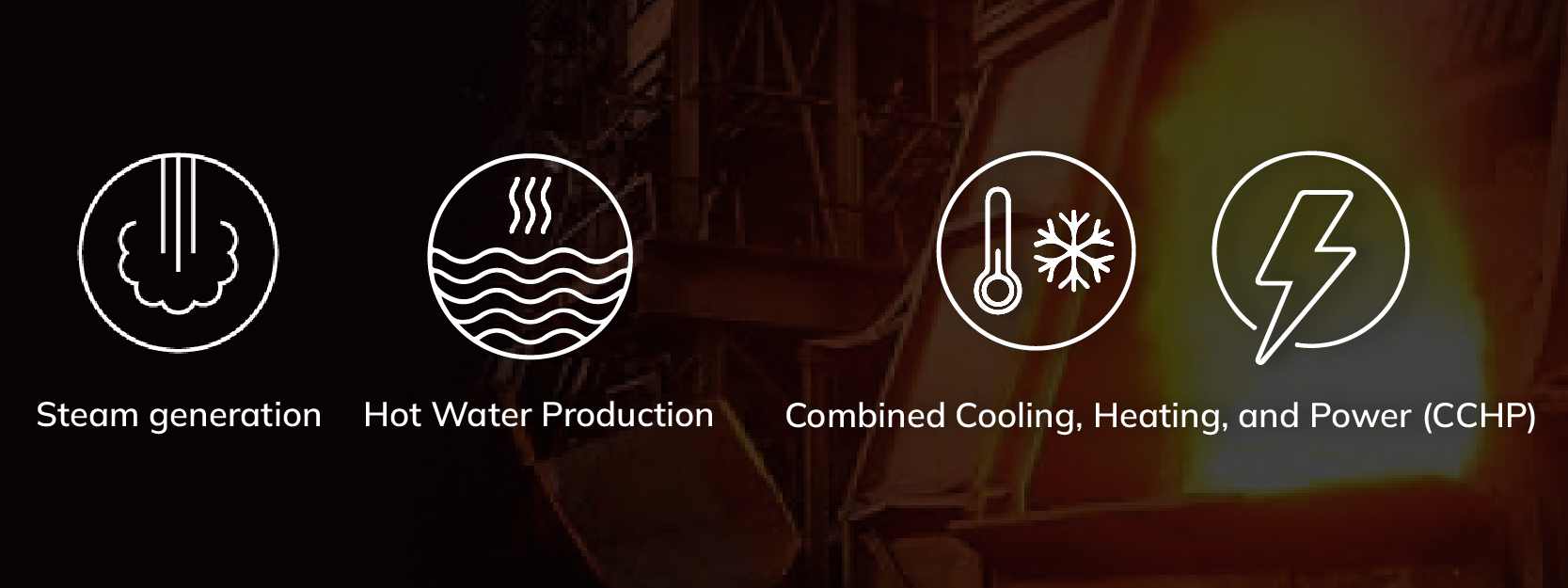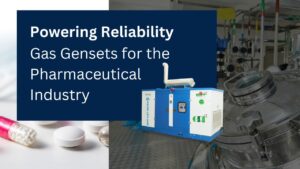Path towards Maximizing Energy Efficiency with Sustainable Operations & Clean Environment:
The overall Energy efficiency can be maximized using Cogeneration and Trigeneration solutions and is a transformative force to achieve sustainable Goals towards Clean Environment. Such Solutions minimizes energy loss and optimize the Energy Consumptions Generating at least two sets outputs with single Point energy Input. The second and third Outputs are Generated using Waste Heat Recovery Solutions and Generally are in the form of Electric Power, Thermal Energy (Steam, Hot water etc.) and Cooling (Chilled water).
Benefits of Harnessing Waste Heat:
- Steam Generation: High Temperature Exhaust/ Flue gases (Generating out of the reciprocating engines, Turbines, Furnaces, Kilns etc) are emitted at the temperature of 4000 C to 5000 C are passed through a waste heat recovery boiler (WHRB) generating Steam at desired Temperature & Pressure. This steam can be used for various Heating processes in industries and Hotels etc. This steam can also be used for producing Power and Chilled water for Process or comfort cooling applications. Example: In a Pharma Industry the waste Flue Gas from the Natural Gas Driven Reciprocating Engine is used to produce Saturated Steam at 8 Bars pressure and is used in Process of manufacturing of Drugs.
- Chilled Water Generation: Absorption chillers use Heat Energy to produce the Chilled Water which can be used for the Comfort Air-conditioning or Process Cooling Applications as well. Example: In Big Hotels and Commercial Buildings the waste heat (Exhaust and Hot Water) from the Natural Gas Genset can be used in the Absorption Chillers to produce Chilled water at 70C which is further passed through Air Handling Units (AHU’s) for the Comfort Cooling / Air-conditioning application thereby reducing the electricity usage in electrical chillers for temperature control systems. The result is a more comfortable working environment for employees and lower energy costs.
- Hot Water Production: Recovered waste heat can be used to produce hot water, benefiting industries such as food production and hospitality. Example: The recovered waste heat is also used to generate hot water, which is vital for the manufacturing process like humidity Control etc. It preheats water used for cleaning equipment and sterilizing products, reducing the plant’s energy expenses, and ensuring a continuous supply of hot water
- Industrial Processes: Excess heat powers various industrial processes, increasing energy efficiency and lowering operational costs. Example: The excess heat is channeled to power various industrial processes, including drying raw materials. This accelerates production, minimizes energy usage, and lowers operational expenses by preheating ingredients with waste heat.
Cogeneration & Trigeneration
Cogeneration:Generation of two types of Usable Energies with single Fuel Input is known as Cogeneration. The First Output is Generally Electrical Power and other can be either Steam or Hot water – This is also known as CHP (Combined Heat and Power). However, the 2nd out can also be Chilled water in Hotels and Commercial Buildings.
Trigeneration:Generation of Three types of Usable Energies with single Fuel Input is known as Trigeneration. The First Output is Generally Electrical Power, the second one is in the form of heat (Steam/ Hot water) and the third is in the form of Chilled Water – This is also known as CHPC (Combined Heat Power and Cooling).
Energy and Cost Efficiency:
CHP systems not only reduce energy waste and greenhouse gas emissions but also offer significant cost savings by eliminating the need for separate systems.
By harnessing waste heat through the CHP system, the manufacturing facility experiences several key benefits:
They significantly reduce their electricity consumption, leading to cost savings, and lower their greenhouse gas emissions by using waste heat efficiently and operating more sustainably, aligning with modern environmental responsibility.
Green Power International – Championing CHP for a Sustainable Future:
Green Power International is at the forefront of promoting CHP systems and their holistic approach to sustainability. By embracing CHP as a critical strategy for a sustainable energy future, you contribute to a more environmentally friendly energy landscape and a prosperous future.
In conclusion, CHP systems, with their utilization of waste heat, are a crucial aspect of energy production. They enhance efficiency, reduce waste, and promote sustainability. This approach is not only environmentally responsible but also economically beneficial, making it a beacon for a better and more prosperous future.


















